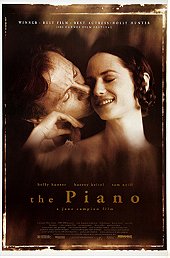Holly Hunter won her Best Actress Oscar over some incredible competition – Emma Thompson, Angela Bassett, Debra Winger, and Stockard Channing – any of whom would have been a great choice. But there’s something about Hunter’s fierce, sensual Ada, a mute woman who expresses herself through her piano and her young daughter, Flora (Anna Paquin). The Piano tells the story of Ada’s regaining her voice, both literally and figuratively, and finding her sexuality in the harsh New Zealand landscape.
The film begins with Ada and Flora arriving on the New Zealand coast to meet Ada’s arranged husband, Stewart (Sam Neill). Over this tableau Ada narrates that she has not spoken since she was six-years-old and nobody, least of all herself, has any idea why. Ada’s giant hoop skirt and European airs, she’s originally from Scotland, are in stark contrast to the looser clothing of the Maori tribesman and Stewart. Much of The Piano sees her growing out of these European ideals, growing out of the forced silence and servitude expected of females, and into her own autonomous person. Quite a bit of her change in attitude comes through a romance between her and Baines (Harvey Keitel), a former whaler who lives on the island and has become one of the Maori.
During her initial meeting with her new husband, he decides to leave her piano on the beach because he does not want to carry it back to his home. When Ada has her daughter try to explain that she needs the piano as a form of communication, he replies that a silent woman has never bothered him. As their marriage progresses there is no warmth or love that grows between them. Flora prefers to create havoc and mischief, and then proclaim innocence as she purposefully misinterprets or edits out parts of the conversation. Once Stewart sells the piano to Baines that sets in motion a series of events which lead to Ada’s awakening and blossoming.
Baines removes the keys from the piano and promises them back to Ada if she will perform various seductive tasks. A bit questionable, but Baines and Ada have an immediate erotic connection, a meeting of the minds. She’s willing, and willful, to engage him in this back and forth. After a period of time, she has mastered his seductive games and flips them upon him. A romance and love develop between them. The color palette of the film, so far basked in harsh grays and blues, begins to warm into richer colors.
The cinematography by Stuart Dryburgh enhances Jane Campion’s script and directorial choices. It doesn’t just work well with the film, it allows many of the themes and emotions in the film to grow and prosper. Many of the images that linger in the imagination are painter-esque, like Paquin’s Flora frolicking on the beach while Ada plays the piano stuck in the sand. It’s sumptuous film-making, the kind of work that Michael Powell did with Jack Cardiff.
And Campion has chosen well with her four leading actors. Hunter makes Ada grim, dour, a person who lives in their own interior world, refusing to express or interact with the outside world. But as she plays her piano, she escapes and bursts with romantic and erotic longing. She also conveys Ada’s stubbornness; above all else she must have the piano. What’s most transfixing in the moments when Hunter plays the piano is how she transforms into an ethereal figure, losing herself in the music.
Anna Paquin’s work is fairly extraordinary. Child actors in movies can be overly precocious, falling back on their cuteness, or they can be directed to act like miniature versions of adults. Paquin has to straddle the line between being a normal little girl and the mouthpiece of her adult mother. Her Flora is spiteful, a naughty wood nymph who lies breathlessly for her own amusement. Paquin actually is a subtle master class in presenting someone who must say one thing with her voice, but communicate something entirely different with her body language as she speaks aloud for the mother who cannot.
Neill and Keitel offer great support to the two leading female roles. Neill starts off as a well-meaning, if cold and distant, husband who grows into a paranoid and fearful man. While Keitel starts off as a man who is all hard-edges and brutish behavior, before slowly melting away into a tender lover and surrogate father.
The Piano plays like one of the best adaptations of a gothic romance ever made. A totally original movie, with finely detailed and complex female characters in the lead, The Piano is easily a classic in my eyes. A gorgeous, sumptuous feast, a film that populates a specific area in time with unique characters and explores their world thoroughly.
 Login
Login